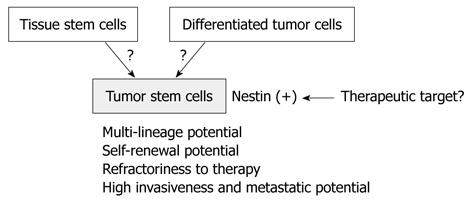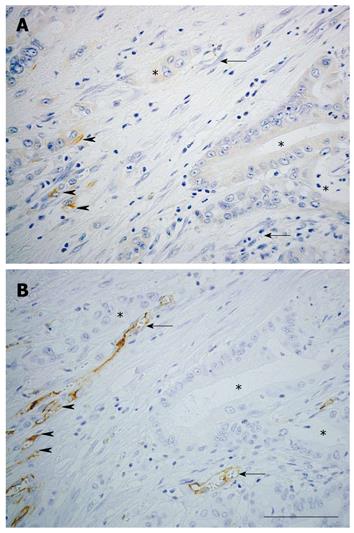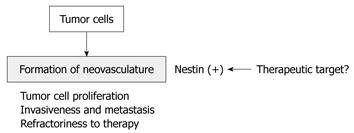Copyright
©2011 Baishideng Publishing Group Co.
World J Gastroenterol. Jan 28, 2011; 17(4): 409-418
Published online Jan 28, 2011. doi: 10.3748/wjg.v17.i4.409
Published online Jan 28, 2011. doi: 10.3748/wjg.v17.i4.409
Figure 1 Tumor stem cells and nestin.
Tumor stem cells have specific characteristics, including multi-lineage potential, self-renewal potential, refractoriness to therapy, and high invasiveness and metastatic potential. The origin of tumor stem cells has not been well clarified, but it is known that some tumor stem cells express nestin in their cytoplasm. Nestin in tumor stem cells thus is considered to be a novel therapeutic target.
Figure 2 Expression of nestin and CD31 in pancreatic cancer tissues.
Nestin is expressed in endothelial cells of small blood vessels (A, arrowheads) and cancer cells (asterisks), whereas it is not detected in large blood vessels (arrows). CD31 is expressed in endothelial cells of most blood vessels (B, arrowheads and arrows), but not in cancer cells (B, asterisks) in pancreatic tissues. Immunohistochemistry: bar, 100 μm.
Figure 3 Tumor angiogenesis and nestin.
Tumor cells induce neovascular formation, known as tumor angiogenesis. Formation of the neovasculature leads to tumor aggressiveness through tumor cell proliferation, invasiveness, metastasis, and refractoriness to therapy. Nestin expression has been reported in tumor vessels, and nestin may be a new molecular target for tumor angiogenesis.
- Citation: Ishiwata T, Matsuda Y, Naito Z. Nestin in gastrointestinal and other cancers: Effects on cells and tumor angiogenesis. World J Gastroenterol 2011; 17(4): 409-418
- URL: https://www.wjgnet.com/1007-9327/full/v17/i4/409.htm
- DOI: https://dx.doi.org/10.3748/wjg.v17.i4.409











